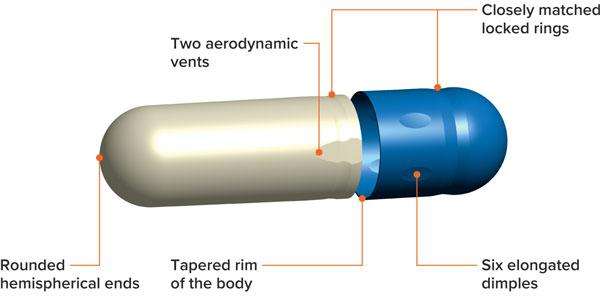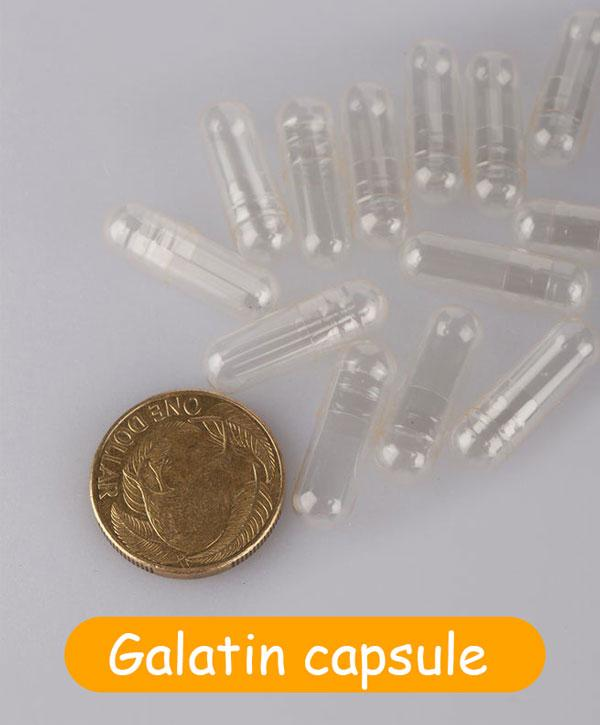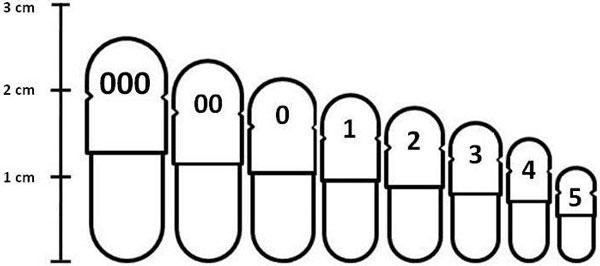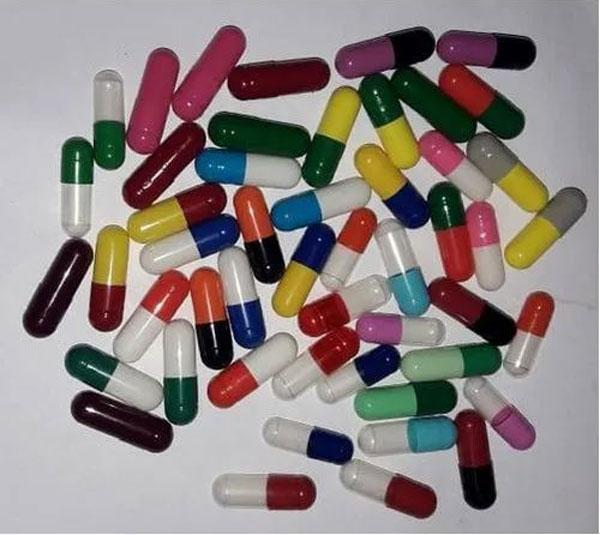Capsules provide a convenient and customizable way to administer medicines, supplements, and other active ingredients. Back in 2020, the global market value of the empty capsules industry was valued at $2.382 billion, and it is assessed to hit $5 billion by 20230.

As these capsules contain medicinal items, the raw material selected to make them should not only be safe but also should be compatible with inner fillings and have a specific release/dissolve time. If you are a pharmaceutical/dietary manufacturer or just a knowledge seeker to learn from which materials these empty capsules are made, then read on!
➔ Checklist
1. What is an Empty Capsule?2. What is an Empty Capsule Made of?3. What are the Uses of Empty Capsules?4. Size, Color, and Customization of Empty capsules5. Benefits and Considerations of Empty Capsules6. Conclusion
1) What is an Empty Capsule?
“As the name suggests, an empty capsule is a small container which is used to hold liquid or solid medicinal stuff.”

Empty capsules come in 2 forms;
● In the form of a single sealed ● In the form of 2-separate parts ( body and cap ), which fit together and can be opened/closed anytime.
Sealed capsules are used for liquid products, while body/cap capsules contain solid crushed medicine. Both of these, when eaten, get dissolved in the stomach and release the medicine.
Empty capsules are a very efficient and easy way to eat medicine orally because they contain a specific dose of medicine; second, unlike sour tablets, you don’t get to taste the medicine inside and only eat the capsules. These capsules come in various sizes, colors, and sometimes even flavors, allowing for customization based on the product’s specific requirements and branding.
2) What is an empty Capsule made of?
When it comes to empty capsules, their manufacturing materials can be classified into 2-types;
i) Gelatin Capsules
ii) Plant-based (vegetarian) Capsules
i) Gelatin Capsules
“As the name suggests, the main ingredient in Gelatin Capsules is the Gelatin protein, which is made from animal’s body abundant protein, collagen.”

Collagen is present in all animals and is most concentrated in bones and skin. So, to make gelatin, bones from animals, such as pigs, cows, and fish, are boiled, which makes the collagen in them get released into the water and converted into gelatin – later, which is concentrated and converted into powder form. Finally, this powder is made into gelatin capsules.
Gelatin capsules are known for their stability, bioavailability, and compatibility with various substances. They can be either hard or soft, with soft gelatin capsules offering greater flexibility and easy swallowing.
ii) Vegetarian Capsules
Also known as plant-based or vegan capsules, these are made from 2-main kinds of materials:

● Hydroxypropyl Methylcellulose (HPMC), or you can also simply say cellulose – abundant stuff in plant cell walls.● Pullulan – which is derived from tapioca plant roots.
Both are suitable for individuals who prefer plant-based/ vegetarian options and are often used to accommodate various dietary restrictions.
3) What is the use of empty capsules?
Empty capsules are a practical and versatile tool in various industries, primarily the pharmaceutical, healthcare, and dietary supplement sectors, for the following purposes:

|
|
Use of Empty Capsules |
|
Pharmaceuticals |
|
|
Dietary Supplements |
|
|
Nutraceuticals |
|
|
Cosmetics & Personal Care |
|
|
Flavor & Fragrance Delivery |
|
|
Veterinary Medicine |
|
|
Research and Development |
|
4) Size, Color, and Customization of Empty Capsules?
When it comes to empty capsules, each and everything about them can be customized, such as;
i) Size of Empty Capsules
ii) Color of Empty Capsules
iii) Other Customization
i) Size of Empty Capsules
“Capsule size is denoted by numerical values, with size 000 being the largest and size 5 being the smallest.”

Empty capsules come in various sizes, offering flexibility in accommodating different dosages and substances – whether it’s a potent medication requiring a small dosage or a dietary supplement needing a larger dose.
ii) Color of Empty Capsules
“Using different colors in capsules serves both aesthetic purposes and practical ones.”
Different manufacturers use their own color mixture to distinguish their products from the rest. However, the color of the capsules can also be used to;

● Differentiate between different medicines in them ● The different dosage quantities/strengths
This visual distinction enhances safety and compliance, making capsules more user-friendly and effective.
iii) Other Customization
“Besides color and size, the pharmaceutical and dietary manufacturers also customized the flavor, shape, and active ingredients in their capsules.”
Changing the flavor, like neutral, sweet, salty, etc., can help the brands stand out their products from the rest of their competitors, which will enhance their sales and profits.
5) Benefits and Considerations of Empty Capsules?
➔ Benefits of Empty Capsules
These capsules can contain all forms of medicine like liquid, crushed, granules, etc. So, they can be practically used in every industry.
These capsules are very good storage containers – they protect the medicine from humidity, bacteria, sunlight, air, etc., and give it a long shelf life.
Medicinal companies manufacture these capsules of a specific size, customized to each medicine quantity and strength, ensuring the users get the right amount every time.
It is best for kids and adults who can’t eat bad-taste tablets – they can swallow neutral or sweet capsules directly, and when in the stomach, the bad taste of medicine will get released. Besides taste, capsules can mask the smell, ensuring your mouth doesn’t smell bad.
The dissolving time of each capsule can be customized; emergency medicine capsules can be set to dissolve within seconds, while dietary supplement capsules can be made to dissolve slowly and keep the dosage for a longer period ( which ensures that you eat medicine a lot less in a day ).
➔ Considerations of Empty Capsules !
Producing capsules can vary based on the capsule’s material, size, and customization options. This cost may influence product pricing.
Some individuals may have allergies or sensitivities to certain capsule materials, affecting their ability to consume products encapsulated in them.
Depending on the industry and region, regulations and standards may govern the use of capsules in pharmaceuticals, dietary supplements, and other products.
The choice between gelatin and plant-based (vegetarian) capsules depends on dietary preferences, cultural considerations, and potential allergies or sensitivities.
Gelatin capsules are often derived from animal sources, which can raise ethical and environmental considerations. Plant-based capsules offer a more sustainable option in this regard.
The shelf life of capsules can vary based on their composition and storage conditions. Manufacturers and consumers must be mindful of expiration dates to ensure product efficacy and safety.
The dissolution time of a capsule’s shell can affect the release of the enclosed substance in the body. Some pills may dissolve more quickly than others, influencing the timing of the substance’s absorption.
6. Conclusion
Whether you’re a manufacturer seeking top-quality capsules or a discerning consumer aiming to make informed choices, understanding the intricacies of empty capsules, their materials, and their diverse applications is crucial for making the best decisions.
We hope this comprehensive information equips you with the essential knowledge to navigate the capsule world effectively. We at Yasin stand out as the optimal choice if you are searching for dependable capsule manufacturers. We offer a range of capsule solutions, from Gelation to plant-based materials, tailored to meet your needs.
article source: https://www.china-capsule.com/news/composition-of-empty-capsules-what-materials-are-used/
Media Contact
Company Name: Yasin
Email: Send Email
Country: China
Website: https://www.china-capsule.com/
